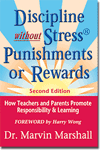 His approach is the only system that is proactive, totally noncoercive, and does not use external manipulatives or threats. He INDUCES students to WANT to act responsibly and WANT to put forth effort to learn.
His approach is the only system that is proactive, totally noncoercive, and does not use external manipulatives or threats. He INDUCES students to WANT to act responsibly and WANT to put forth effort to learn.
His book, "Discipline without Stress® Punishments or Rewards - How Teachers and Parents Promote Responsibility & Learning" is used in schools, universities, and homes around the world. The book clearly and concisely demonstrates how external approaches of relying on rules, imposing consequences, rewarding students for appropriate behavior, and punishing students to make them obey are all counterproductive. His approach reduces stress and is more effective than traditional approaches that focus on obedience because obedience does not create desire.
 A prime reason that the approach is the fastest growing discipline and learning system in the country and is taught in so many universities is that it teaches students to understand differences between internal and external motivation. A second reason is that the focus is on promoting responsibility; obedience then follows as a natural by-product. A third reason is that the system separates the deed from the doer, the act from the actor, a good kid from irresponsible behavior, thereby eliminating the natural tendency for a student to self-defend.
A prime reason that the approach is the fastest growing discipline and learning system in the country and is taught in so many universities is that it teaches students to understand differences between internal and external motivation. A second reason is that the focus is on promoting responsibility; obedience then follows as a natural by-product. A third reason is that the system separates the deed from the doer, the act from the actor, a good kid from irresponsible behavior, thereby eliminating the natural tendency for a student to self-defend.
Dr. Marshall gives permission to download and reproduce anything from his websites as long as www.MarvinMarshall.com is included. Visit his teaching model at http://www.marvinmarshall.com/in-housedetails.html.
He offers the following resources to learn and support his approach:
http://www.marvinmarshall.com This is the foundational site that links to the teaching model, shares how a school can conduct its own in-house staff development, and contains free information for implementation. For a quick understanding of his approach, link to "THE HIERARCHY" and "IMPULSE MANAGEMENT."
http://www.disciplinewithoutstress.com This is the website for the best-selling book on discipline and learning. Three sections of the book are online: Classroom Meetings, Collaboration for Quality Learning, and Reducing Perfectionism.
http://groups.yahoo.com/group/DisciplineWithoutStress.com is used to post questions, share ideas, and give assistance.
http://www.DisciplineAnswers.com has a compilation of previously asked and posted answers categorized from the above Yahoo site.
http://www.AboutDiscipline.com explains reasons that external approaches - such as rewarding appropriate behavior, telling students what to do, and punishing them if they don’t - are not used to promote responsible behavior.
http://disciplineforsmartpeople.com This web log (blog) contains short posts to help implement the totally noncoercive - but not permissive - approach.
NEW! Discipline Without Stress, Inc.- a nonprofit public charitable devoted to teaching the Discipline Without Stress Teaching Model, now being offered to low economic schools in the U.S.A.
Free books at http://www.disciplinewithoutstress.com, free In-House Staff Development at http://www.marvinmarshall.com/In_House_Package.html and, depending upon location, free personal presentations by Marv Marshall. For more information: http://www.marvinmarshall.com/in-housedetails.html
The requirements for application can be found at http://www.DisciplineWithoutStress.org



 His approach is the only system that is proactive, totally noncoercive, and does not use external manipulatives or threats. He INDUCES students to WANT to act responsibly and WANT to put forth effort to learn.
His approach is the only system that is proactive, totally noncoercive, and does not use external manipulatives or threats. He INDUCES students to WANT to act responsibly and WANT to put forth effort to learn.
